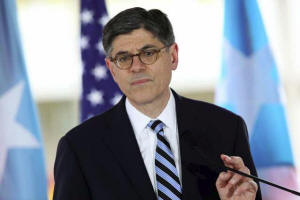|
Treasury's Lew: China pause on reforms
would have 'very bad consequences'
 Send a link to a friend
Send a link to a friend
 [June 04, 2016]
By David Lawder [June 04, 2016]
By David Lawder
SEOUL (Reuters) - U.S. Treasury Secretary
Jack Lew said on Friday China would see "very bad consequences" for its
economy and bilateral U.S. relations if it backs away from its stated
goals to open its markets and rebalance its economy toward consumer-led
growth.
Lew, in an interview with Reuters in Seoul, said he would "keep
the pressure" on Chinese officials during talks in Beijing next week
to stick to their reform commitments and execute pledges to reduce
excess industrial capacity that is distorting world markets.
China faces diminished economic prospects in the medium and long
term if it fails to continue its reforms, Lew said.
"Frankly, if China takes a time-out or a step back on the reform
agenda, that will have very bad consequences for China's economy and
it will flow over and not be good in terms of our bilateral economic
relations," Lew said.
The U.S.-China Strategic and Economic Dialogue meetings on June 6-7
in Beijing come at a time of increasing trade tensions between the
world's two largest economies.
 The U.S. Commerce Department has recently imposed steep anti-dumping
and anti-subsidy duties on a wide-range of Chinese steel products,
while U.S. business groups have complained about new Chinese
regulations they say favor local firms.
Meanwhile, the Chinese yuan is plumbing five-year lows against the
dollar, raising concerns about the potential for another devaluation
as the Federal Reserve prepares to resume interest rate increases
after pausing for the past few months.
Lew said China had largely been keeping its G20 commitments to avoid
competitive currency devaluations, adding that its action in recent
months to spend reserves to support the yuan, also known as the
renminbi or RMB, have been consistent with those commitments.
"China's intervention in the last year has not been to devalue but
it's been largely to support the RMB," Lew said. "I think the test
of whether China's moved decisively in an orderly way to a more
market-oriented exchange rate is whether they're willing to tolerate
movement in both directions."
Likewise, Lew said South Korea also needed to resist temptations to
intervene in currency markets when there is upward pressure on the
won. He said Seoul had refrained from active interventions for the
past six to nine months.
"We have made it clear that we've recognized that. But we've also
said that that has to be a durable policy. It has to be a policy
that can withstand pressure when markets are going in both
directions," he said.

[to top of second column] |

Treasury Secretary Jack Lew addresses the media during a visit at
the Medical Center Hospital in San Juan, Puerto Rico, May 9, 2016.
REUTERS/Alvin Baez/File Photo

He said South Korea's interest in joining the Trans-Pacific
Partnership free trade bloc, assuming the deal is ratified, would
provide an incentive to improve its exchange rate policy. A currency
side-agreement to the TPP would require transparency in
interventions and commitments to avoid interventions to gain trade
advantages.
The U.S.-China economic and foreign policy talks in Beijing will
also provide a forum to air U.S. business groups' concerns about
regulations in China that they say favor domestic firms.
For example, foreign insurers have raised concerns about new cyber
security regulations that require "secure and controllable"
information technology.
"Whether it's an anti-monopoly law, or a national security law, if
it's being either designed or implemented in a way that's designed
to create undue burdens on foreign competition, that's problematic,"
Lew said.
Lew said it was important for the next U.S. president to continue
the Strategic and Economic Dialogue because otherwise such disputes
may not be discussed on a bilateral basis.
At a separate meeting on Friday with South Korean Finance Minister
Yoo Il-ho, Lew said that coordinated global action was needed to
increase pressure on North Korea to drop its pursuit of nuclear
weapons.
A senior Treasury official said that this would require additional
actions by China to adhere to new sanctions aimed at cutting off
North Korea from the international financial system until it changes
its behavior.
(Editing by Kim Coghill and Jacqueline Wong)
[© 2016 Thomson Reuters. All rights
reserved.]
Copyright 2016 Reuters. All rights reserved. This material may not be published,
broadcast, rewritten or redistributed.
 |